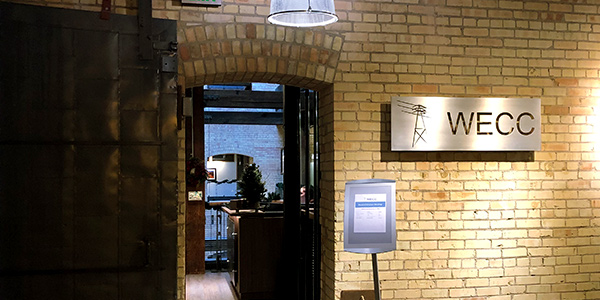With the COVID-19 pandemic threatening to overwhelm hospitals, WECC is in no hurry to bring employees back to work at its Salt Lake City headquarters, CEO Melanie Frye said Wednesday.
“If you had asked me a year ago, would we ever be able to put a 140 WECC staff at home for nine months and have them successfully deliver on the [organization’s] scorecard and the goals we’ve set for ourselves, I probably would’ve lost that bet. I’m so proud of our team,” Frye said during her quarterly report to WECC’s Board of Directors.
Frye told the board WECC will maintain its work-from-home policy at least until Feb. 1, 2021.
“We really want to see what the impacts of the holiday season are. We’re not going to rush to bring folks back into the office,” she said.
Frye said WECC is “encouraged” by the news that a vaccine could be approved in the U.S. as soon as this week. “That may make a difference for us, but we’ll continue to be cautious in how we proceed.”
Any reopening of the office will be “gradual,” with staff invited to return on a voluntary basis “at first, with all of the necessary precautions,” she said. WECC’s reopening plan includes reduced capacity in offices, masking and physical distancing, with no in-person meetings and limited travel for staff.
Frye said WECC has learned a lot about the ability of its staff to work remotely and the technologies that enable the practice. She lauded the staff at WECC and the industry at large for their “resilience” and ability to pivot from traditional in-person meetings to “creative, innovative” ways to continue the same work virtually.
“In the new year we’ll also start looking at what our post-COVID world will look like from an organization standpoint and what the right mix of flexibility and potential work-from-home is for the staff while also making sure we’re focusing on continuing the WECC culture,” she said.
Regarding the culture, Frye said she was “thrilled” to report that a recent employee engagement survey indicated a high level of satisfaction among WECC staff. Denison Consulting completed the survey last month.
“I will say I had a little trepidation going into that because of the pandemic and just the fact that we hadn’t been directly connected face-to-face with our team,” Frye said.
The results showed that, compared with other surveyed organizations worldwide, the regional entity scored in the 90th percentile in many areas among staff for perceptions of adaptability, mission, involvement and consistency. “Stakeholder focus” was the one area that fell below that level, “so we have a little bit of work to do there,” she said.
Frye pointed out the survey had a 94% response rate. “For those of you who have conducted surveys in organization, I think you’ll agree with me that’s almost unheard of to have that high of a response rate,” she said.
Peak Donation
Frye also reported that WECC last week signed an agreement to accept a $4 million donation (previously estimated at $3.8 million) from Peak Reliability, representing funds left in the accounts of the Western Interconnection’s former reliability coordinator after it settled obligations in the wake of its dissolution a year ago. The board approved the move at its September meeting. (See WECC Board Approves New Chair, Long-term Strategy.)
WECC officials will now work with the board, industry stakeholders and the Western Interconnection Regional Advisory Body (WIRAB) “to identify what would be the best use of” the money, Frye said.
“We do want to make sure to focus on the guiding principles of doing something that aligns with the WECC reliability risk priorities, as well as something that would be enduring, something that would potentially enhance WECC’s ability to be responsive to reliability challenges,” she said.
WECC staff will draw up proposed ideas to be shared next year with WIRAB and WECC’s Member Advisory Committee and standing committees in order to seek input and advice. A final list of recommendations will be shared with the board “at some point,” Frye said.
“But I want to emphasize that we’re not rushing to spend this money. We need to make sure that it’s used for something that would be of high value,” she said.






